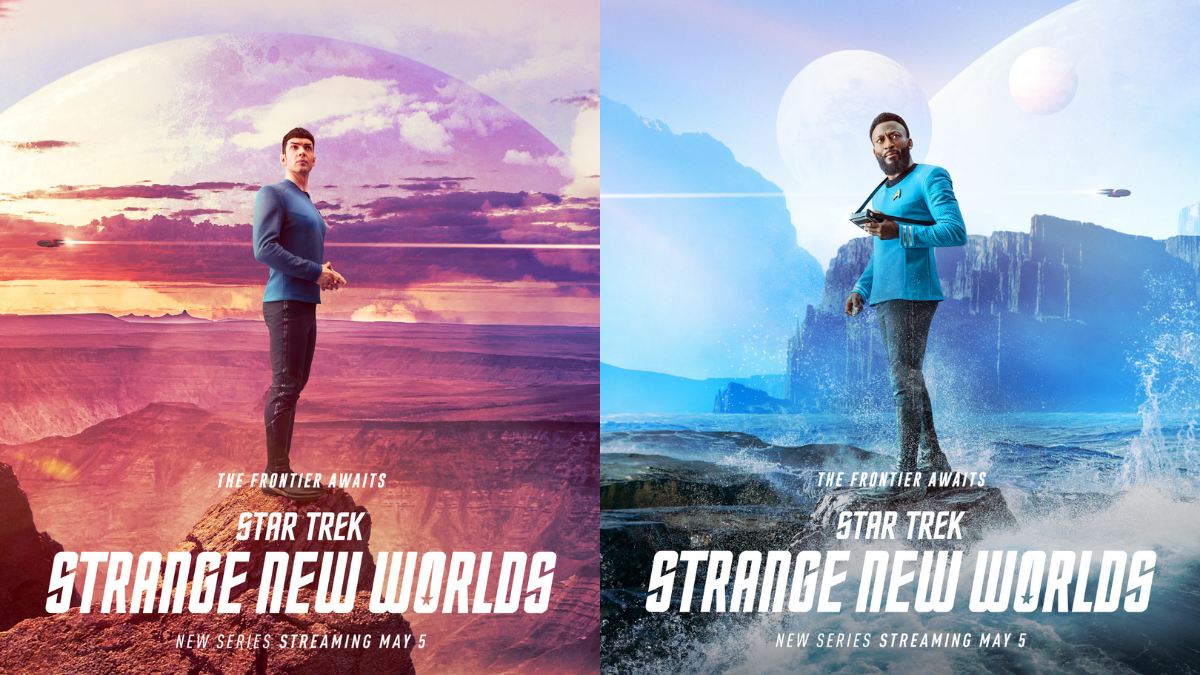INTERVIEW: Author Dayton Ward on undertaking the "epic tale" of the new Star Trek: Coda novel trilogy

Star Trek’s Coda trilogy begins today with Moments Asunder by Dayton Ward
SEPTEMBER 28, 2021 - Dayton Ward has been writing Star Trek novels and other formats for almost 20 years. He has twice won the Scribe Award from the International Association of Media Tie-In Writers, and when he isn’t writing, he is consulting in the wider Star Trek environment for ViacomCBS.
Dayton’s latest book, Moments Asunder, is out today, September 28, and begins the story of a temporal apocalypse, opening a trilogy with fellow Trek authors James Swallow and David Mack. The trilogy is called Coda, and Dayton was gracious enough to take time out of his busy schedule to catch us up on what is going on behind this wild ride, as it has been called by those in the know.
Let’s begin at the beginning and get everyone up to speed on your origin story. How did you get started writing Star Trek novels, and how did that lead to becoming a consultant for the franchise?
I’d written and submitted short stories which were selected for publication in each of the first three Star Trek: Strange New Worlds anthologies. Those collections were the result of contests held each year, soliciting Star Trek stories from new/unpublished writers. After winning a berth in the third anthology in late 1999, I’d rendered myself ineligible to enter future contests. Editor (at that time) John Ordover offered me a contract to write a Star Trek novel. That was an Original Series book, In the Name of Honor, published in early 2002, and I’ve been writing Star Trek novels (among various other things) ever since.
My current consulting arrangement with ViacomCBS came about in early 2019. I work for John Van Citters, who currently serves as Vice President for Star Trek Brand Development within the larger ViacomCBS Global Franchise Management arm. In this capacity, I consult on various “expanded media” projects such as novels, comics, games, and other narrative-based experiences that extend the Star Trek brand beyond television and film. I also stay up to date on all of the Star Trek series currently in development and production, which includes reading scripts and other material with an eye toward identifying opportunities to extend those shows into the expanded media space. It’s about as cool a job as it sounds. ;)
You've spent most of your time writing in the Original Series and Next Generation quadrants of the Star Trek universe. What draws you to those characters and stories, as opposed to other characters and stories that you don't tend to write about?
My favorite of the bunch remains the Original Series, as that’s the Star Trek I grew up on. Therefore, writing for those characters is always tremendous fun. Likewise, the projects which are “Original Series-adjacent” like the Star Trek: Vanguard and Star Trek: Seekers novels are right there in that same wheelhouse. Next Generation is the one with which I seem to have the next best level of familiarity. It’s likely that along with the way scheduling just seemed to work out for a certain period of time that saw me writing several Next Generation novels in or near succession. That said, I’d write something for any of the other shows if I thought I had a decent story to tell featuring those characters.
You (and sometimes with your writing partner, Kevin Dilmore) have written parts of book series before, like the Legacies series for the 50th anniversary of The Original Series. Now, your new book just coming out, Moments Asunder, begins what promises to be a pretty special trilogy, Coda, with the other installments coming soon from James Swallow and David Mack. The series title implies a conclusion of sorts, so what is the backstory and motivation for this new series?
With the arrival of new Star Trek series on television (and perhaps films in the near future), it quickly became apparent that the continuity established and furthered by various authors across multiple series – particularly those set in the Next Generation/Deep Space Nine/Voyager timeframe – would soon fall out of step with whatever new “canon” was to be established on screen. While the Star Trek novels are not canon, they are official and approved by ViacomCBS, and there’s a natural desire to see such works written in such a manner that they’re accessible to the widest possible audience. Having new novels on the shelf which are consistent with the adventures unfolding on screen is an important part of that strategy.
For those of us who’ve done this sort of work for any length of time, it’s also not an uncommon thing to encounter. It’s also nothing new to Star Trek. Go back and read the Star Trek comics published by DC in the 1980s and 1990s when there were still Original Series films being produced, and note how their storylines had to “change lanes” to realign themselves with new information put forth in the latest movie. Why does it feel like such a bigger deal this time? Perhaps because those sorts of transitions happened more frequently back in the 80s and 90s when Star Trek was regularly on TV and in movie theaters. In this case, we were given a great deal of latitude for a great many years, starting around the time Star Trek: Voyager finished its broadcast run and after the release of Star Trek Nemesis. We were allowed to do all sorts of things with the characters and storylines that we never would have been able to accomplish while those shows and films were in active production, At the time and for many years afterward, no one was thinking we’d ever see Jean-Luc Picard or Kathryn Janeway on our TV screens again, but here we are!
For Moments Asunder specifically, what was the process of coming up with the story that sets all this in motion?
Everything was done in concert with James Swallow and David Mack. We developed the entire trilogy storyline together, and worked out how it would unfold across each of the three books. We all came to the table with various ideas and our individual “wish lists” for what we wanted to accomplish, and then kept moving pieces around the board until we had a clear picture from start to finish. With that in hand, we each wrote our respective outlines and vetted them together, after which we submitted the entire package to our editors at Simon & Schuster, who then sent them on to ViacomCBS for approval.
Then came the hard part, when we each went to our respective corners and wrote our books. We knew the stakes would be high, and that this project would likely attract more attention than our usual Star Trek novel efforts, so there was a bit of self-inflicted pressure on all our parts. I know it sounds a bit corny to say, but like our readers we are huge fans of this material and there truly is a certain sense of protectiveness and responsibility we can’t help feeling every time we sit down to write a Star Trek novel. After all three manuscripts were delivered, the back-n-forth started again. We each gave copious notes to one another, helped each other over various obstacles, figuring out problems or addressing concerns as a team. Everything that’s in each of these three books is there because we—all three of us—agreed that’s where it should be. Star Trek: Coda has perhaps been the most intense collaborative writing effort in which I’ve ever taken part, but for all the right reasons.
Without spoilers, what’s something you’re most excited for readers to encounter in Moments Asunder?
Speaking as a fan of Star Trek and Star Trek books going back far more years than I want to say out loud, I hope readers get the sense that I—and by extension Jim and Dave—really wanted to stick this particular landing. Yes, we set out to tell an epic tale that pulls the reader in so many different directions, where the stakes are huge and the risk is overwhelming and the payoff comes after an incredible emotional toll. We absolutely wanted to do all of that, but in a way that shows just how much we understand, appreciate, and even treasure the time and commitment (and money!) readers have given this aspect of Star Trek publishing for as much as twenty years. The primary goal for our readers was for them to come away feeling none of that has been wasted.
Do you have a general sense of where you might go in the “Novelverse” once all is revealed at the end of Coda?
Without spoiling anything, at this point all I can say is that there have been Star Trek novels for almost as long as there has been Star Trek. I don’t see that changing any time soon!
Thanks to Dayton Ward for the time and the behind-the-scenes glimpse into the new trilogy! You can order Dayton’s book and preorder the next two – The Ashes of Tomorrow by James Swallow and Oblivion’s Gate by David Mack – at Bookshop.org, Amazon.com, or wherever you get your books.
The wait is almost over! The first book in the Star Trek: Coda trilogy, "Moments Asunder," comes out tomorrow. ✨ #StarTrek @GalleryBooks https://t.co/U82eSVG6Dj pic.twitter.com/abupKKEQ3F
— Star Trek (@StarTrek) September 27, 2021
David is a contributing writer for Daily Star Trek News on the Roddenberry Podcast Network. He is a librarian, baseball fan, and book and movie buff. He has also written for American Libraries and Skeptical Inquirer. David also enjoys diverse music, but leans toward classical and jazz. He plays a mean radio.





